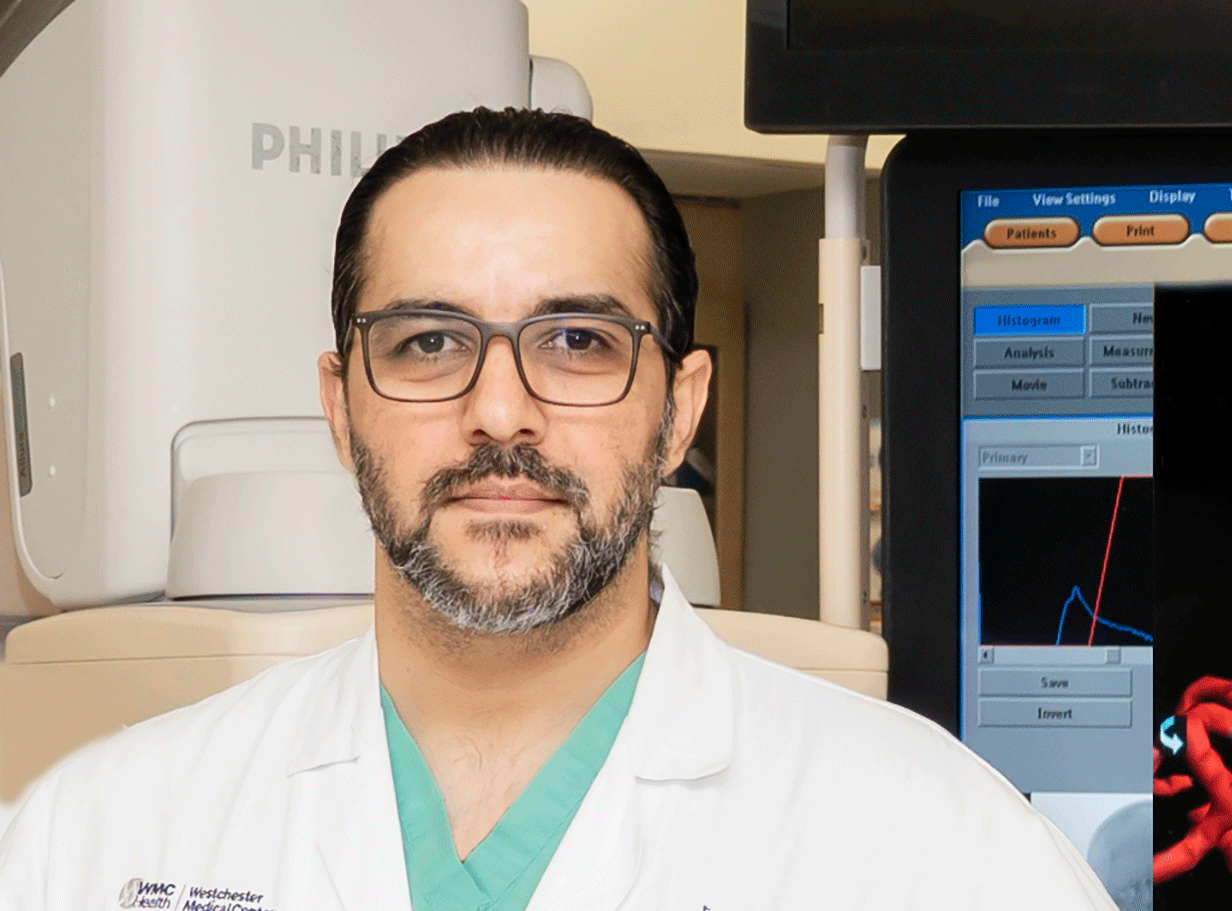War, Migration and Perseverance
How Fawaz Al-Mufti, M.D., Became a Triple Board-Certified Physician

Fawaz Al-Mufti, M.D., was one year out of medical school, without a chosen specialty, when war thrust him into emergency medicine. It was 2003 and senior staff at the Nahrain Teaching Hospital in Baghdad, Iraq, where Dr. Al-Mufti had just finished a transitional residency—including six months of surgical training—were fleeing, leaving him and junior colleagues to treat the surge of civilian casualties.
Two years later, Dr. Al-Mufti was delivering urgent care to people in conflict zones around the world for Doctors Without Borders/Médecins Sans Frontières (MSF). Despite all this experience, he would have to repeat his residency to practice emergency medicine in the United States. Instead, he chose not one but three new specialties, becoming a triple, board-certified neurologist, neurointensivist and neuroendovascular surgeon. “War makes life feel so unpredictable—too short to waste doing the same thing again,” Dr. Al-Mufti says. “I am who I am today because I did not choose the easier path but rather the road less traveled. Instead of considering adversity a problem, I saw it as an opportunity to overcome something to better myself.”
Surviving war informed Dr. Al-Mufti’s remarkable professional evolution, but his tenacity—which propelled him to become associate professor of neurology, neurosurgery and of radiology, as well as assistant dean for graduate medical education research, in addition to being the director of the neurocritical care unit at Westchester Medical Center (WMC)— began much earlier.
Born in Iraq to an economist mother and engineer/architect father, Dr. Al- Mufti grew up traveling the world with his family. From an early age, he spoke English, Arabic, Kurdish, Greek and French, and found acceptance among the Sunnis, Shiites and Kurds in his family. “My multicultural upbringing and the multi-ethnicities in my own family shaped who I was and wanted to become— someone who could accept and help others,” he says.
Although painting was his first love, his concern over Iraq’s civil strife, its suppression of human rights and civilians’ suffering drove him toward medicine. “It always struck me to see people disfigured from war,” he says. “I thought, ‘Had this person received the proper care, maybe they would not be disfigured.’ I wanted to create beauty on paper, but I decided to create art through medicine.”
He recalls his early, by-the-bootstraps training, when trucks dropped off 50 to 100 patients at the hospital daily, and he and fellow medical staff had to triage. “One of us would open a textbook and read out loud what to do to save someone’s life,” he says. Yet, he wanted to do more.
For the next five years, he helped MSF deliver urgent health care to under-resourced communities in conflict zones around the world. “MSF goes where nobody goes,” he says. “There are no hospitals, no roads, just mud houses. I decided to dedicate my career to helping these people.”
Upon moving to the U.S. in 2009, with his wife and six-month-old daughter, he learned that he would have to repeat his residency to practice emergency medicine, so he decided to change specialties. "I chose neurology because I wanted to learn more about the brain," he says. “I love the adrenalin rush of acute care. Following my neurology training, neuro-critical care seemed like the perfect marriage between neurology and emergency medicine.”
In addition to treating cerebral aneurysms, cranial and spinal arteriovenous malformations, acute stroke, as well as intracerebral hemorrhage, Dr. Al-Mufti instructs medical students, residents and fellows. He conducts his own research into subarachnoid hemorrhage and acute ischemic stroke. He also developed WMC’s neurocritical and neuroendovascular protocols, featuring a training curriculum for neurocritical care nursing and neuroendovascular “boot camp” for neurology and neurosurgery residents, fellows, nurses and technologists.
Having survived multiple wars and engaged in two careers, Dr. Al-Mufti now lives with his wife, a pediatric neurologist, and their four children. “I am most thankful for every day I spend with my family and their endless support. They are my muse, my rock and the compass that guides me.”
To all of this, he credits his triumph over adversity. “You have two options,” he says. “You either curl up in a fetal position to protect yourself, or stand up strong, weather the storm and emerge on the other side.”
